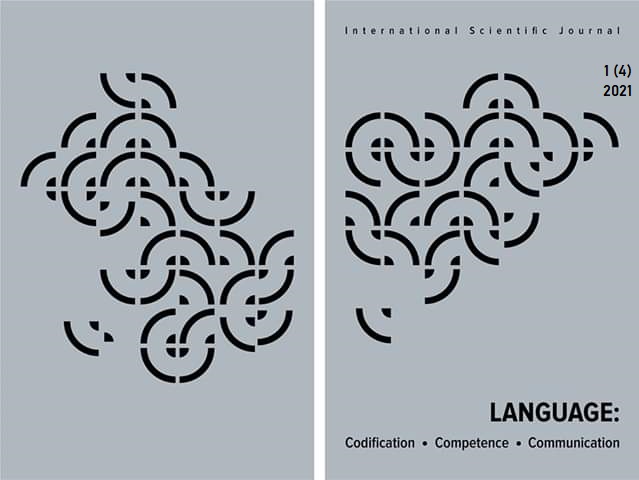HISTORICAL ASPECT OF THE STUDY OF TAX TERMINOLOGY IN RUSSIAN
DOI:
https://doi.org/10.24025/2707-0573.1(4).2021.233118Abstract
Abstract
Background. In modern linguistics there is particular increasing of interest to historical research of language, especially in the field of professional vocabulary and its functioning. Such an analysis of linguistic means is relevant for all humanities and can be explained by the fact that language reflects the most important changes in the worldview and life of the Eastern Slavs, in particular in the form and content of the semantic class of words having general categorical meaning “tax”.
Problems of taxation and the organization of effective state tax control have interested mankind since ancient times, today they have become the subject of studies of economics and history mainly (R. Bobrynev, M. Boulenger, O. Vasilyk, B. Grekov, L. Larionov, N. Miller, N. Nechay, А. Tolkushkin). There are some researches on the history of the formation of the terminology of the Russian language in the historical aspect (V. Goncharov), however, as far as we know, the nominations that serve to denote taxes have not received comprehensive coverage in the linguistic literature yet.
The purpose of our study is to analyze the nominations that form the semantic class of words meaning “tax, duty, levies”. Studying the specifics of their semantics and functioning in the vocabulary context will solve a number of issues related to the history of the formation of tax terminology in general.
Methods. The main research methods are descriptive and comparative-historical, with the help of which we trace changes in the specified group of lexical units, elements of quantitative analysis are also used.
On the basis of 313 lexical items (nominations of taxes, processes and people related to the tax sphere), selected by the method of continuous sampling from dictionaries the historical changes that occurred to this vocabulary in the process of development were analyzed. Chronological boundaries cover the XIth-XVIIth centuries.
Results. The study of the history of the tax terminology of the Russian language has both theoretical significance ‑ awareness of how the world and realities are reflected in society under the influence of various factors, as well as practical application, as this layer of vocabulary relates to various spheres of political, cultural, economic life but it is not described well enough by linguists.
The nominations analyzed by us, denoting various taxes, levies, duties, units of the tax sphere, names of people and territories taxed and not taxed by tribute, make it possible to distinguish six functional-thematic groups of nominations of the tax terminology.
The analysis of each of the groups allows us to conclude that the individual nominations had not one but several terminological meanings (for example, tribute). The names that reflect the genus and species nominations of fees, tributes, fines and others were very numerous. Often these nominations combine two meanings: levies and duties, duties and levies, taxes and fees, which indicates a lack of regulation in the field of tax terminology and the lexical system as a whole.
We have represented productive and non-productive ways of word formation of nominations; we have found that the morphological way of creating these words is the most productive.
The phenomenon of synonyms and antonyms is recorded in the system of tax terminology. Two-word (compound) names are replaced by one-word nouns.
Discussion. Thus, numerous names of the tax terminology are not included in the vocabulary of modern Russian literary language. Only some of them can be found in literary works, which describe similar realities (“Journey from St. Petersburg to Moscow” by A. Radishchev, “Dead Souls” by N. Gogol, “Who in Russia to live well” by N. Nekrasov etc); others generally lost the meaning of “tribute, tax”.
We see prospects in the study of the functional dynamics of the nominations of the tax terminology system, as well as in elucidating their role in the Russian linguistic world view.
Keywords: history of language, nominations for tax designation, semantics, vocabulary, word-formation model.
Downloads
Published
Issue
Section
License
Copyright (c) 2021 Larysa Kornovenko, Наталія Іванова, Ольга Рижченко

This work is licensed under a Creative Commons Attribution-NonCommercial 4.0 International License.
Authors hold full copyright and at the same time they transfer the publishing rights to the journal. The author of a published article has the right to distribute it, post the work in the electronic repository of his/her institution, publish as a part of a monograph, etc. with a required link to the place (output) of its first publication.
The authors confirm that the scientific article submitted for publication has not previously been published and has not been submitted to the editorial office of other journals.
If you have any questions, please contact us:
email: ukrmova@chdtu.edu.ua, o.pchelintseva@chdtu.edu.ua
Viber / WhatsApp: +38 093 789 09 27


